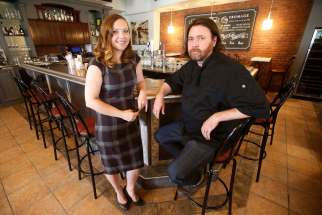Feeling the heat From health restrictions to staffing woes, restaurateurs keep a lot of plates spinning as the pandemic tests the limits of their passion
Read this article for free:
or
Already have an account? Log in here »
To continue reading, please subscribe:
Monthly Digital Subscription
$0 for the first 4 weeks*
- Enjoy unlimited reading on winnipegfreepress.com
- Read the E-Edition, our digital replica newspaper
- Access News Break, our award-winning app
- Play interactive puzzles
*No charge for 4 weeks then price increases to the regular rate of $19.00 plus GST every four weeks. Offer available to new and qualified returning subscribers only. Cancel any time.
Monthly Digital Subscription
$4.75/week*
- Enjoy unlimited reading on winnipegfreepress.com
- Read the E-Edition, our digital replica newspaper
- Access News Break, our award-winning app
- Play interactive puzzles
*Billed as $19 plus GST every four weeks. Cancel any time.
To continue reading, please subscribe:
Add Free Press access to your Brandon Sun subscription for only an additional
$1 for the first 4 weeks*
*Your next subscription payment will increase by $1.00 and you will be charged $16.99 plus GST for four weeks. After four weeks, your payment will increase to $23.99 plus GST every four weeks.
Read unlimited articles for free today:
or
Already have an account? Log in here »
Hey there, time traveller!
This article was published 30/06/2021 (1627 days ago), so information in it may no longer be current.
There’s a gently sunbleached sign outside Preservation Hall that reads, “We can’t wait to meet you.”
Inside the Empress Street restaurant, husband-and-wife owners Tristan and Melanie Foucault still haven’t met many of their regular customers in person since opening one year ago. Instead, Instagram followers have taken the place of a full dining room and timeline posts have become a stand-in for the daily special spiel.
“You post about the fish and all of a sudden you have a 300 per cent increase in fish sales,” Melanie says. “You do see a direct correlation between the people that are commenting, liking, sharing and supporting the restaurant and the people that are actually placing orders.”
In the era of COVID-19 and ever-changing public health restrictions, social media — Instagram, in particular — has been a major lifeline for restaurants. It’s not a new form of promotion within the industry, but now, even for the tech-averse, it’s a necessity.

Chris Elliott, senior economist with Restaurants Canada, a national non-profit organization that represents the food-service industry, expects the newfound reliance on social media to live on as one of many permanent changes to the hospitality sector post-pandemic.
“Business has changed,” he says. “Now, you’re forced to engage people differently.”
On June 26, Preservation Hall marked its one-year anniversary by reopening for in-house dining after many, many lean months.
Restrictions are lifting, vaccination rates are climbing and optimism is growing, but restaurants aren’t out of the weeds yet. The Free Press spoke with people from across the industry to find out how the business of dining has changed and what the future holds — for better or worse.
Melanie and Tristan met at Peasant Cookery, where he was a longtime chef and she was a front-of-house manager. Opening their own restaurant was always part of the plan; doing so during a pandemic was not.
“The (business) model kind of went out the door,” Tristan says. “All the predictions, everything we had to do to get loans… we were expecting to do X-amount in sales and we’re doing fractions of that.”
Preservation Hall is a 5,000-square-foot French-inspired eatery built around Tristan’s mastery of cured meats, pickles and preserves. The Foucaults have only hosted dine-in guests for 26 of the last 52 weeks and as a new business, they aren’t eligible for most government relief programs, which require a demonstrated loss of revenue over previous years. Booths are separated by Plexiglas screens and there are about 50 chairs, unusable in a physically distanced dining room, stacked high atop their walk-in freezer.
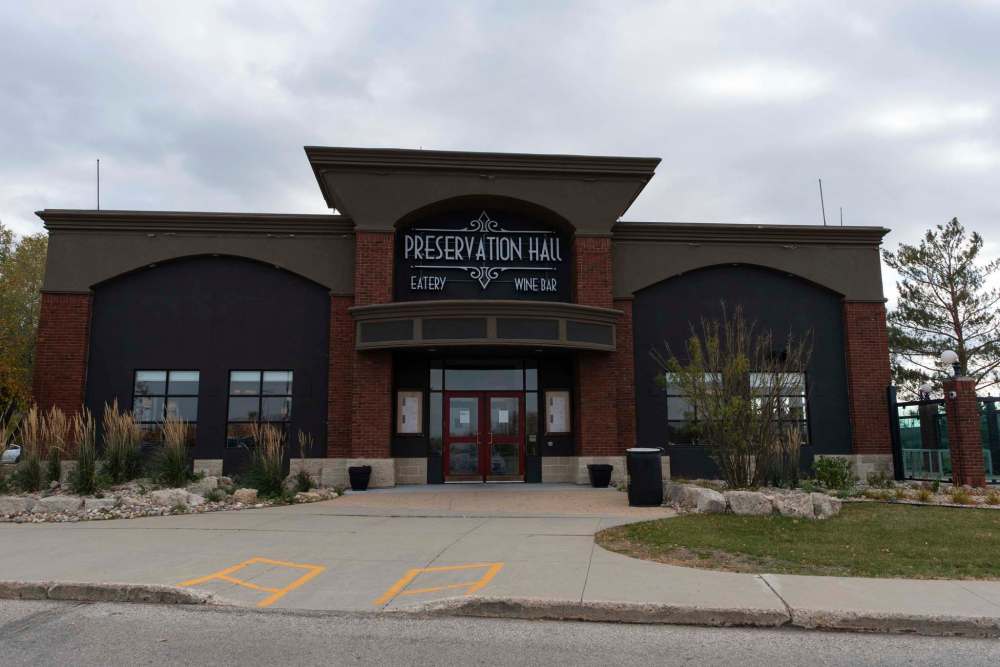
It’s not the restaurant of their dreams, but it’s not quite a nightmare either.
“We’re a glass-is-half-full kind of place,” Melanie says. “If we can make it through this past year, I really think we can make it through anything.”
• • •
For many brick-and-mortar restaurants, the relief of reopening has been overshadowed by staffing shortages. The problem is evident in pages upon pages of urgent help-wanted ads posted to local classified websites.
A recent survey by the Manitoba Restaurant and Foodservices Association found that, on average, restaurants were expecting only 34 per cent of pre-pandemic employees to return to work.
“Most of our amazing staff have transitioned to new industries because of the difficulties in ours,” says Kristjan Kristjansson, owner and president of Brazen Hall.
The Pembina Highway restaurant and brewery typically operates with 85 people in front- and back-of-house positions. Last Friday, only 20 of those jobs were filled.
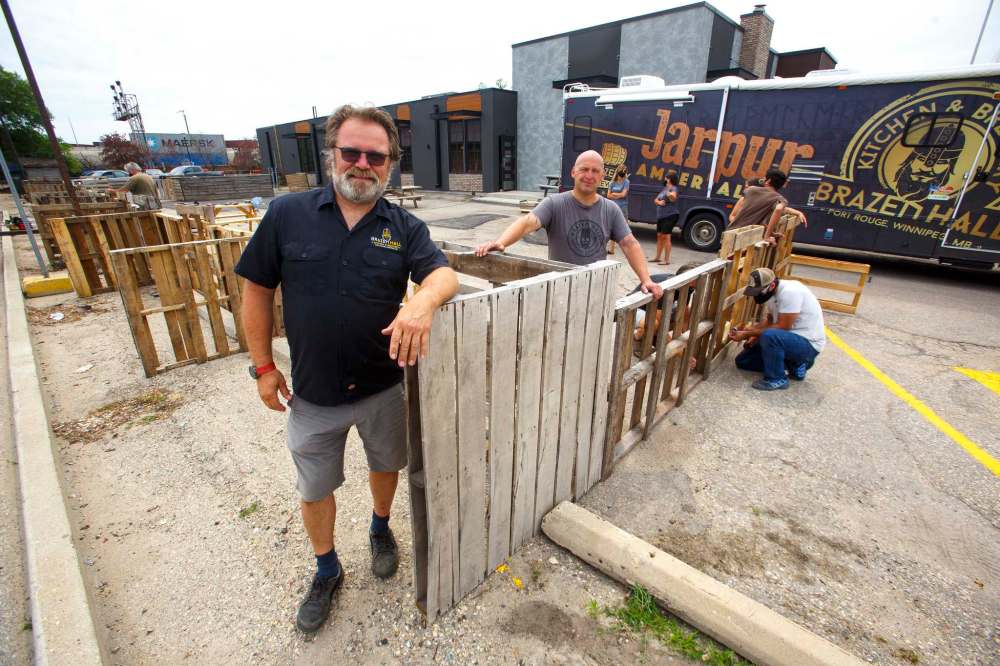
Kristjansson has turned to technology as a stopgap measure. Each table on the restaurant’s new 94-seat patio is now equipped with a scannable QR code, allowing guests to place orders and pay via their cellphones without interacting with a server. It’s an extension on contactless menus used at some other restaurants.
“The food gets delivered by a friendly face and you can keep ordering another drink or some more French fries, whatever you want,” he says. “You pay when it’s done and you tip or don’t.”
Training new hosts, servers and bartenders is a lengthy, costly process.
At Brazen Hall, labour represents roughly 30 per cent of each bill and while Kristjansson knows diners enjoy the experience of table service, he also believes in the value of convenience. Software-supported dining may sound dystopian, but it could be an effective way for casual dining restaurants to cut costs while catering to a modern, tech-savvy clientele.
“If the trend goes that route and people like it, well, those jobs are permanently gone,” he says. “I gotta pay my $5,000 or whatever it costs to put in the software, but then that’s it and I don’t have to worry about the employment side of it — and that’s a terrible thought.”
As restaurants struggle through reopening, diners are in for more surprises. Service will likely suffer while new, inexperienced staff learn the ropes, says Kristjansson, and menu prices are on the rise. “We’re not going to like our restaurants for a while.”

Manitoba has lost nearly 12,000 jobs in the hospitality sector since February 2020, according to data from Restaurants Canada. Employment numbers aren’t expected to return to normal until next year.
Zack Clarke may never return. After 12 years in the industry, the former front-of-house manager at Nonsuch Brewing Co. was laid off during the first lockdown. He waited for restaurants to reopen, collecting employment insurance and federal emergency benefits, and worked casual bartending gigs during the summer. The second lockdown forced him to cut ties with what was once a viable career.
“That’s when I started expanding my horizons,” says Clarke, who eventually landed a job at BZAM Cannabis, a dispensary on Corydon Avenue.
Adjusting to the slower pace of retail was a challenge, but he’s found familiar satisfaction in learning about new products and helping customers. Still, when the province announced an easing of restrictions, Clarke was tempted to jump back behind the wood.
“The allure is there,” he says. “I don’t want to go back to it full-time — I just don’t think my heart’s in it anymore — but I miss draught beer so much. I just can’t wait to pull a tap again.”
Many industry friends have also moved on and Clarke is curious to see how restaurants fare over the next year. He expects fewer people to rely on serving jobs as their only source of income in the future and hopes this moment of upheaval leads to positive changes for workers (restaurants in the United States have started offering higher wages and competitive benefit packages in an attempt to lure staff back to work).
“I’d love to see a transition away from a cash-flow, tip-based business and more towards a strong employer-employee relationship,” Clarke says. “We can make it more sustainable and we can focus on what restaurants are supposed to be, which is about food and exploring things, instead of the hustle and bustle.”
• • •
When sending an email to Kosmo’s Space Cowboy Food Cantina, expect to receive a response from Cosmo Kramer. No, the fictional character from the popular ’90s sitcom Seinfeld doesn’t have a stake in the local ghost kitchen and yes, the alias is totally on-brand for owners Stefan Lytwyn and Nyk Bielak.
On social media, the cousins trade in memes, goofy catchphrases and over-the-top internet slang to promote their indulgent to-go menu. But it’s not just silliness for silliness’ sake.
“Being a completely digital restaurant, that’s the face you show to the world,” Bielak says. “A restaurant can decorate their interior and use lighting and music. We were like, OK, we can do something similar but we have to do it all on social media.”

The pair started Kosmo’s last October on a whim after Lytwyn stepped away from cooking at Deer + Almond and Bielak returned home after seven years of performing with the Broadway musical The Book of Mormon. The ghost-kitchen concept — where a restaurant operates without a storefront — provided opportunity in an untapped market.
“We didn’t see it happening in Winnipeg very much,” Lytwyn says. “(It’s) very low overhead, you don’t have to worry about a dining room, you don’t have to worry about flatware or plates or anything.”
All they needed was a bare-bones kitchen and an internet connection, which they found in the basement of the German Society of Winnipeg. Word of Kosmo’s spread quickly through Instagram and the business has grown five-fold in less than a year, thanks to a loyal following of “Kosmoheadz.”
“It was like this cool, hip secret,” Bielak says. “What started as a fun little COVID project has snowballed into… our whole lives.”
The menu is based entirely around food that travels well — burgers, sandwiches, tater tots, mac ‘n’ cheese — and the cost of using delivery apps, some of which charge 35 per cent in commission, is baked into the bottom line. The flexible business model means Kosmo’s hasn’t been majorly affected by changes to public health orders.
On the flip side, Bielak and Lytwyn have little control over food quality once an order is out the door and their revenue stream is stunted because people tend to buy less food via delivery compared with in-house dining.
So far, Winnipeg has been fairly slow on the uptake (two WOW Hospitality-operated ghost kitchens, Mercy Me! Nashville Chicken and Fuel Functional Foods, have been delivering since 2019), but ghost kitchens have flooded larger centres such as Toronto and Vancouver. It’s a trend with no sign of slowing post-pandemic, says Chris Elliott of Restaurants Canada.
“Ghost kitchens were going to happen anyway,” he says. “What the pandemic has done is accelerate that… restaurants are looking to this as a viable solution.”
Despite the practical benefits, Bielak and Lytwyn aren’t convinced ghost kitchens will proliferate locally. In fact, the entrepreneurs are working towards opening a physical Kosmo’s location in the future.
“I think it’s a smart thing to have in your back pocket, because in reality this probably won’t be the last (pandemic) that we see,” Lytwyn says.
“We did this out of necessity,” Bielak adds. “We would love so much to have dine-in and be able to chat it up with customers.”
• • •
The average Manitoba restaurant is carrying $86,000 in debt right now. Tony Siwicki is in the unenviable position of being above average.
“We’re reaching $160,000,” says the owner of Silver Heights Restaurant and chair of the Manitoba Restaurant and Foodservices Association (MRFA). “You use what’s given to you… and it’s gone already.”
Half of his looming debt load is from federal emergency business loans, which he will have to repay by the end of next year, and the rest is the accumulation of fixed costs — everything from rent, cleaning subscriptions and business licences to utilities, equipment leases, and pandemic health-and-safety upgrades. “It just goes on forever,” Siwicki says.
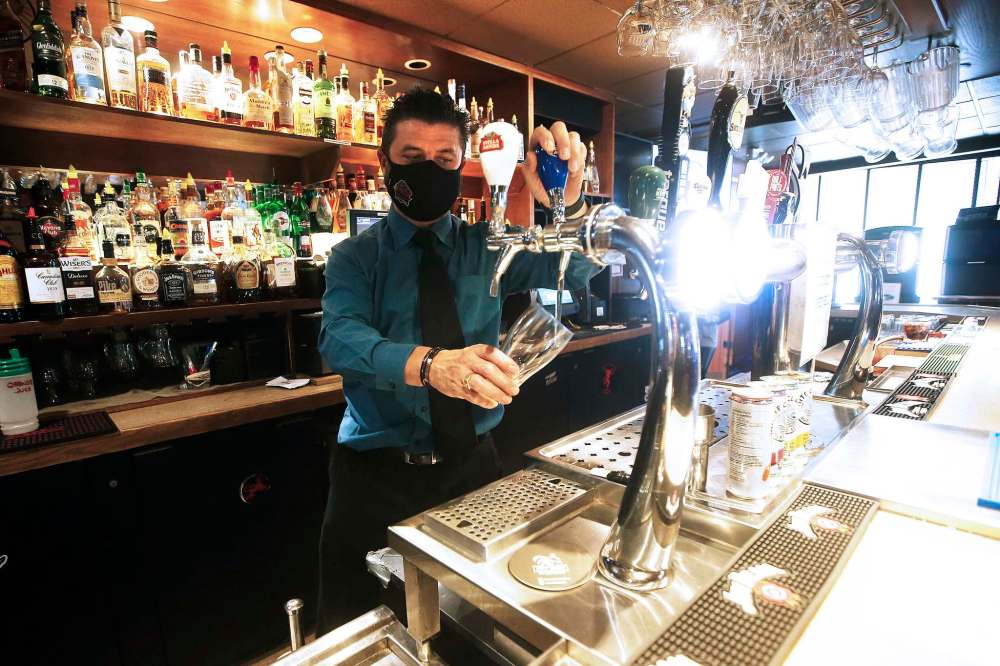
At Silver Heights, which has been operating for 64 years, the financial burden is going to be a factor in every business decision for years to come. Debt repayment will trump restaurant renovations, maintenance and advertising. It will also determine staffing and labour arrangements.
“Instead of growing you’re just patching,” he says. “It’s like the government is the boss, you know; you look after that (debt) because that’s who’s got a hold of you.”
Siwicki believes his restaurant will survive, but says federal and provincial support needs to stick around until the industry fully recovers. Forgivable loans would also be nice.
An estimated 10,000 restaurants, roughly one in 10 food service establishments, have closed across Canada during the pandemic. There are 2,157 restaurants in Manitoba, but it’s hard to gauge the scope of losses locally because the association’s data only accounts for its membership. In Winnipeg, prominent eateries such as Segovia, Hermano’s, Black Bird Brasserie and several Stella’s locations have closed permanently.
“The restaurant I used to take my wife to every year on our anniversary is closed,” says Shaun Jeffrey, association executive director. “It’s a very sad thing.”
Even if they’ve made it this far, Jeffrey predicts more restaurateurs will be forced to throw in the towel owing to debt. Reopening is great, but profit margins are razor-thin with limited capacity.
“They’re carrying a debt load that is totally insurmountable in an industry that makes about five per cent as an average profit,” he says. “That’s why we’re really pushing our provincial government to help with some recovery support.”
Manitoba recently reopened its $5,000 pandemic bridge-grant program, which makes an additional $2,000 available for eligible food businesses; last month, the province unveiled a new wage-subsidy program to encourage employers to hire vaccinated staff.
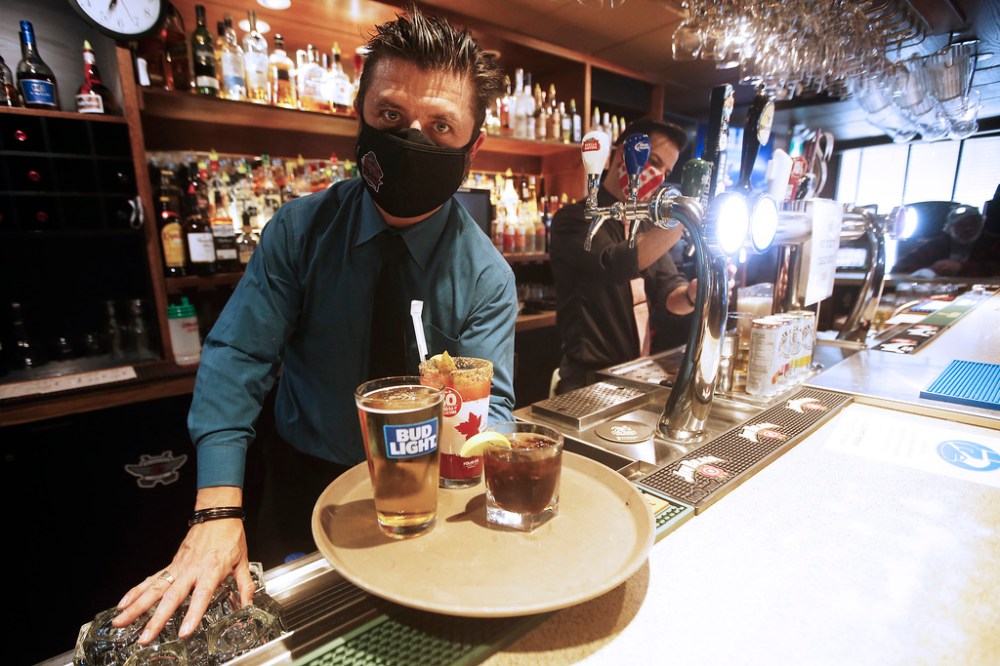
But it’s about more than money. Many in the local hospitality industry have felt unfairly targeted by public health restrictions and Siwicki worries shutdowns have eroded public trust.
“Meanwhile, we’re the only ones that are mandated by liquor inspectors, health inspectors,” he says. “We need the confidence built back up from the government… letting people know we’re safe.”
A recent Restaurant Canada survey found that while the majority of Canadians are eager to get back to outdoor patios, there’s still hesitancy about indoor dining until more people are fully vaccinated or herd immunity is achieved.
• • •
Everything about dining has changed course, not least of all the food.
Over the last 16 months, chefs have had to adjust their menus for takeout and delivery. The to-go trend is guaranteed to stick around and Chris Elliott of Restaurants Canada says many kitchens are scaling back their regular menu options to cut costs.
“It’s going towards that simplified menu, not trying to be all things for all people,” he says. “When you have 100 items on the menu, you now have to carry inventory for all those items.”
Dinner kits, groceries and prix fixe special-occasion meals have also become ubiquitous.
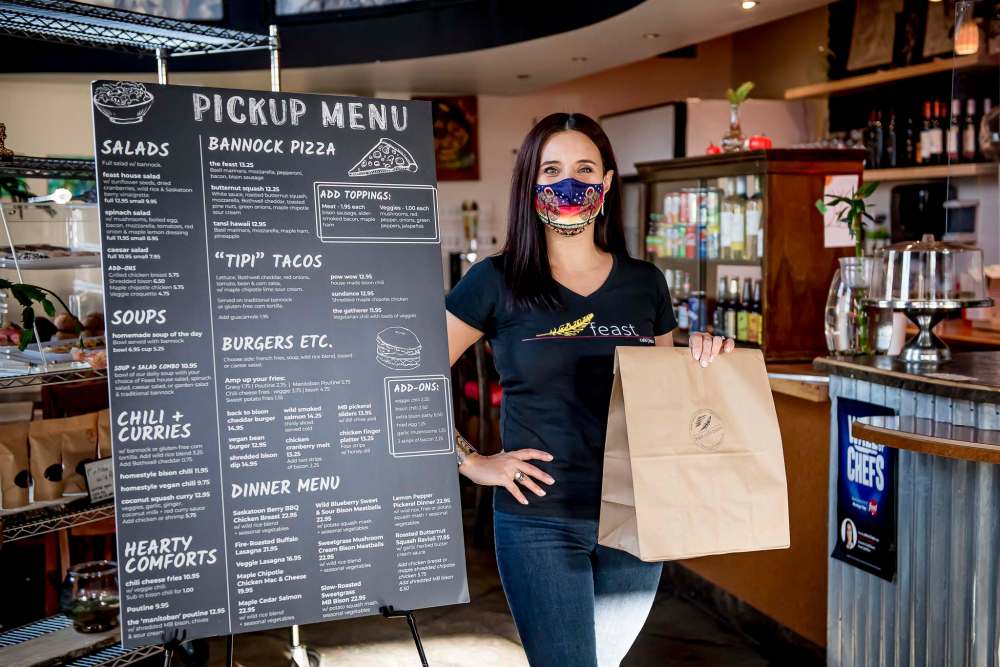
Christa Bruneau-Guenther, owner of Feast Cafe Bistro, was in the midst of expanding her kitchen when the pandemic hit. Catering had become a larger part of the business and she was busy building more cooking, prep and storage space in the basement of the Ellice Avenue restaurant. Plans shifted after the first lockdown.
“We decided to change some purchases… to accommodate our grab-and-go menu and our prepared meals,” she says.
A deep-freeze became top priority and the dining room was shuffled around to make room for a self-serve market full of premade dinners, spreads and sauces. While Feast’s regular menu hasn’t changed much — Bruneau-Gunther says she feels “lucky that I’m not a fine dining restaurant; most of my food works well for takeout” — the grab-and-go options are likely a permanent addition.
“It went over really well,” she says. “All of a sudden there was homeschooling while trying to work from home and there were lineups at the grocery store… it was a great outlet for families and people to come and grab home-cooked, nutritious food.”
Cooking food for others has been Bruneau-Guenther’s saving grace amid the pandemic. Like many people interviewed for this story, the public health crisis has pushed her to the brink. The exhaustion in her voice is palpable. There are days she considers giving up. Yet, like many people interviewed for this story, she perseveres.
The suffering in the hospitality sector is one of the dominant narratives of the pandemic. But the inhospitable landscape hasn’t deterred new restaurants from opening and the bleak financial outlook hasn’t caused existing operators to quit en masse. It’s illogical, but it comes down to purpose.
“They haven’t lost the passion,” Elliott says of restaurant workers and owners. “That’s what’s really kept them going throughout all this.”
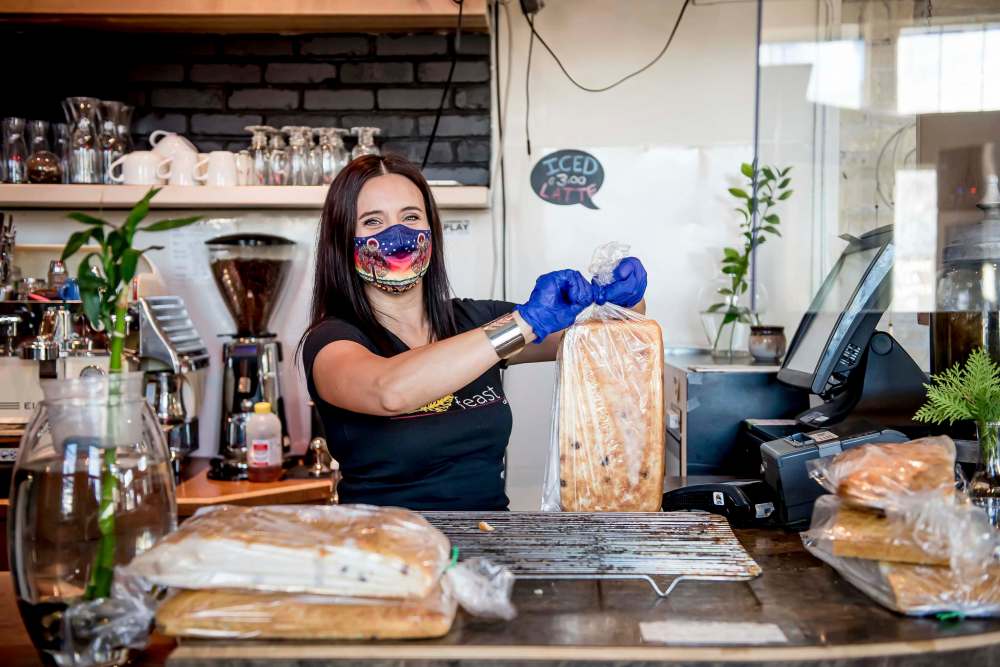
Bruneau-Guenther, who is Métis and a member of Peguis First Nation, is on a mission to build community and keep Indigenous food traditions alive, for example.
“I didn’t open a restaurant because I wanted to become rich,” she says with a laugh. “It was to create jobs for people, particularly those who might have barriers to employment… and to really highlight and celebrate the spirit of our ancestors.”
For Melanie Foucault of Preservation Hall, it’s about connecting with guests.
“People go out for dinner, they celebrate milestones, special occasions by doing that,” she says. “Being part of those milestones was something that was truly special.”
For Tony Siwicki, whose grandfather opened Silver Heights in the 1950s, it has a lot to do with legacy.
“This is our life; this is what we know,” he says.
Whether passion is enough to keep the lights on long-term, is yet to be seen.
eva.wasney@freepress.mb.ca
Twitter: @evawasney

Home cooks could be in hot water
The pandemic has given rise to a bevvy of online food businesses — some operating legitimately, many not.
Since March 2020, the province has received more than 250 complaints about people making food at home for sale through social media, compared to just over 100 complaints the previous year. Aside from non-hazardous fare sold at farmers markets, it’s illegal in Manitoba to sell homemade food for public consumption.
Megan McGhie has been knowingly operating in contravention of those rules since last fall, when she started selling homemade pasta and meatballs to strangers on Instagram under the moniker Noods + Balls. What started as a way for the owner of Hair Co. Exchange to supplement lost income and fill her time while the salon was closed has turned into a serious side hustle.
“I just kept selling out of everything,” she says. “And people just kept asking.”
At her busiest, McGhie filled 85 orders of ragu, lasagna, meatballs and pasta sauce in one week out of the small kitchen in her River Heights home. The demand, she speculates, is driven by public desire to partake in new food trends and support local entrepreneurs.
Online, McGhie is upfront about the fact she’s selling homemade food. Support from customers — many of whom, she says, are chefs and restaurant workers — and necessity has made the illegal venture feel justified.
“I would never condone somebody in my business doing stuff like this — it feels very condtradictory — but it’s also become sort of a matter of survival,” McGhie says, adding she’s emboldened by the abundance of other home-based food vendors on social media. “Everyone else is doing it; I’m jumping on the bandwagon.”
Recently, a local restaurant owner threatened to report McGhie to the province if she continued selling pasta. She’s decided to press pause on Noods + Balls, either indefinitely or until she can find a commercial kitchen space.
Public Health inspectors are currently investigating 70 complaints regarding home-based food businesses, according to a provincial spokeswoman via email. Over the last year, six have been ordered to close owing to unsanitary conditions and operating without a permit. None have been ticketed. The majority of operators comply once they have been contacted by the department.
At the moment, inspectors are focused on enforcing pandemic health orders — making a widespread crackdown on home kitchens unlikely in the near future.
McGhie has a food-handler certificate and while she agrees food safety regulations are necessary, she believes operator knowledge should be more important than location.
“Even if I was in a commercial space… I’m still the person who has to handle all the food and proper protocols,” she says, adding that people will continue selling food illegally as long as public demand remains.
“This has always been a thing. I think it’s just in the spotlight right now because it’s something a lot of people could pivot to.”

Our newsroom depends on a growing audience of readers to power our journalism. If you are not a paid reader, please consider becoming a subscriber.
Our newsroom depends on its audience of readers to power our journalism. Thank you for your support.






